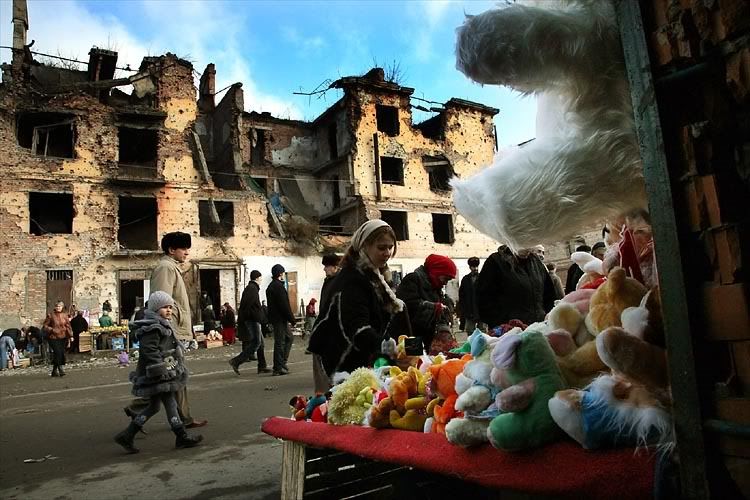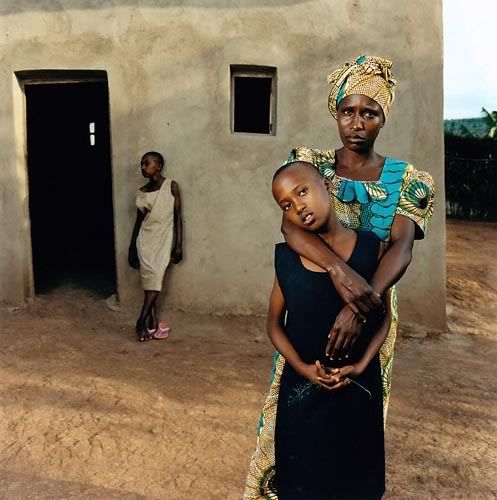How a UNICEF Photo Makes the West's Heart Ache
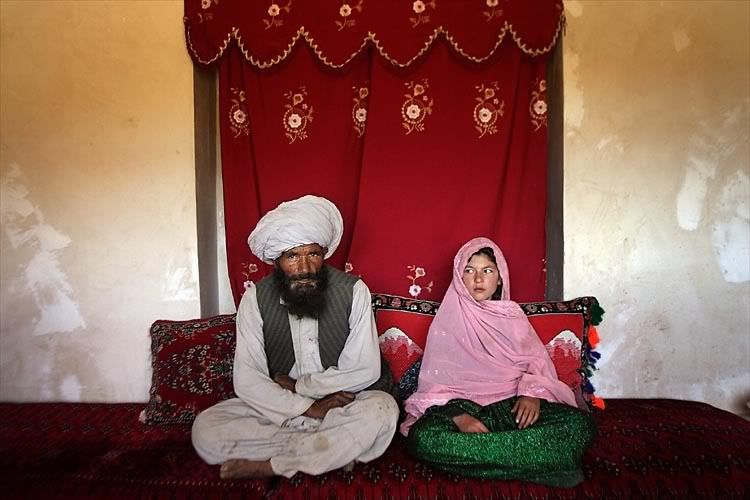 40-year-old groom sitting beside his 11-year-old future bride in Afghanistan, brought Stephanie Sinclair top honors in the annual Photo of the Year contest sponsored by the United Nations Children's Fund (UNICEF).
40-year-old groom sitting beside his 11-year-old future bride in Afghanistan, brought Stephanie Sinclair top honors in the annual Photo of the Year contest sponsored by the United Nations Children's Fund (UNICEF).At Der Spiegle, Leon de Winter writes:
An 11-year-old child bride sits next to her 40-year-old fiance. For UNICEF, this was the Photo of the Year. Dutch writer Leon de Winter laments the perversity of this wedding picture and the frightening relativism of the West.
There are people who will look at this image and be able to continue with business as usual -- without disgust, nausea and rage. We are beholding the fiercest barbarism imaginable. But a carefree cultural relativism -- which this age has donned as its outward manifestation of decadent indifference -- allows many to simply look away. They turn away from the sight of an 11-year-old girl, who is about to be raped by the man sitting next to her.
The girl was sold by her parents, even if they probably wouldn't use that word. The caption that came with the photo quoted the parents as saying that they "needed the money."
The girl's soon-to-be husband promised to send his 11-year-old bride to school, but the women living there in the village of Damarda in Afghanistan's Ghor province don't believe this fairytale. They predict that the girl will bear children soon. "Our men don't need educated women," they point out.
A dowry was paid for the girl. The dowry is part of the cultural fabric of the clan-based society. As producers of newborns, women are valuable possessions. A woman can bear sons and fighters, who will defend the family and its honor. Men are only charged with protecting them against kidnappers and thieves, and women need only accept the power of the male members of the family -- "for their own benefit."
Love Is a Word from the Decadent West
It is likely that all of the female forebears of the girl in the photograph were likewise sold -- and the girl, no doubt, saw it as her fate. At the same time, she realizes that what is happening to her is not right. She might think it is "natural" for a young girl to be sold, but she also knows that it's neither good nor legitimate for her to spend the rest of her life as this man's slave. It is a type of knowledge that has little to do with experience. Rather, it is knowledge that is rooted in humanity, and in the hopes and dreams of a little girl.
The man in the image is oblivious of his wrongdoing. He's only doing what his forefathers did. Sticking to traditions increases the chances of survival. His seed will create a new person and strengthen the clan. He will impregnate this girl without love and without regret, since love is a word from far-off stories and songs, a word from the decadent West, where people have no comprehension of the harshness of life in the desert and of war without end, which is the essence of life in this part of the world.
What we witness in this photograph is an unadorned view of humanity's collective past, of the horror of our brutal nature. Love, tenderness, beauty, individuality and respect are all phenomena that we have imposed upon our nature. Since time immemorial, this nature has allowed only the strongest to survive. In our Western consciousness, we have suppressed this nature with conviction and success. This image shows a small, everyday moment that wouldn't surprise anyone in the Taliban -- but looks quite different to our eyes.
A Bold Statement in the Era of Political Correctness
Our eyes behold an abomination. Our eyes have learned to see the world from the perspective of a slowly acquired sense for humanity. And although more and more voices tell us that we -- the former colonialists and imperialists -- have lost the right to judge other cultures, we know just as well as this girl that this marriage is wrong.
I believe that there are regressive cultures. In an era of political correctness, this is a tricky statement. But there is no other statement that can be made about this image. We behold a regressive man, who is taking what he has purchased.
Many of us in the West are convinced that our presence in Afghanistan cannot be justified, that our troops should withdraw and that Afghanistan should be left to the Afghans. They ask themselves: Who are we to believe that it is inhumane to sell an 11-year-old girl? Who are we to impose our values so vehemently on the Afghans, on this man and on this girl?
I don't have a clue who we are. But I know that this universe is not only a universe of iPods, Disneylands, CO2 penalties, tax write-offs, and New Year's sales in our department stores. No, I know that this is also a universe of human rights. I know that this universe is deeply shaken -- right down to its core -- by the suffering of this lonely, lonely little girl.
 Second-place honors went to GMB Akash, of Bangladesh, whose winning photo shows a 12-year-old boy toiling in a Bangladeshi brickyard. UNICEF studies conclude that 4.7 million children between five and 14 years of age are involved in child labor in that country.
Second-place honors went to GMB Akash, of Bangladesh, whose winning photo shows a 12-year-old boy toiling in a Bangladeshi brickyard. UNICEF studies conclude that 4.7 million children between five and 14 years of age are involved in child labor in that country.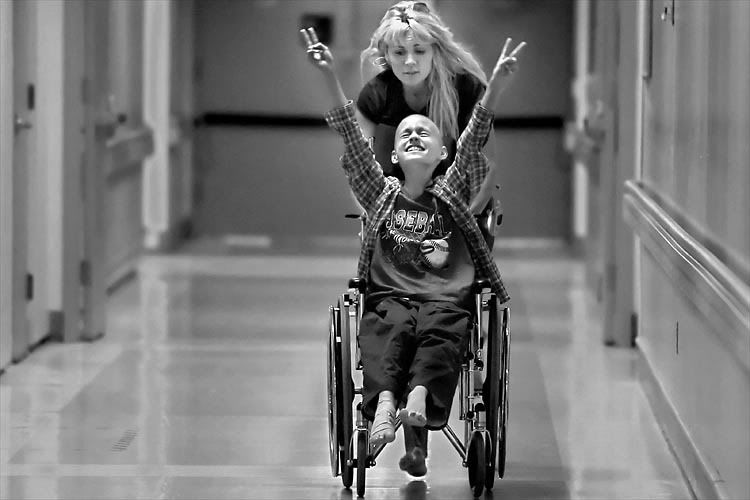 "A Mother's Journey": The American photographer Renee C. Byer took this picture as part of a series about a single mother with five children and a son suffering from terminal cancer. He died in 2006.
"A Mother's Journey": The American photographer Renee C. Byer took this picture as part of a series about a single mother with five children and a son suffering from terminal cancer. He died in 2006.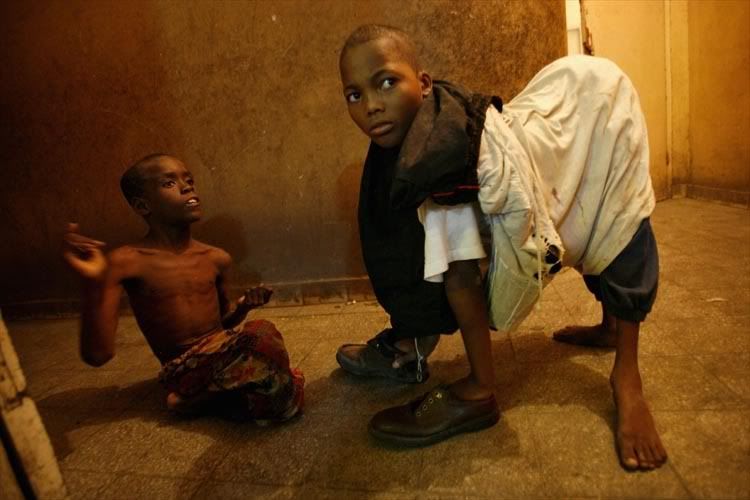 Finbarr O'Reilly recieved an honorable mention for his photo "A House of Hope," an image of Lopez Vidal, right, and Aron Masahuka, both afflicted with polio, languishing in an ill-equipped hospital in Kinshasa, Democratic Republic of Congo.
Finbarr O'Reilly recieved an honorable mention for his photo "A House of Hope," an image of Lopez Vidal, right, and Aron Masahuka, both afflicted with polio, languishing in an ill-equipped hospital in Kinshasa, Democratic Republic of Congo.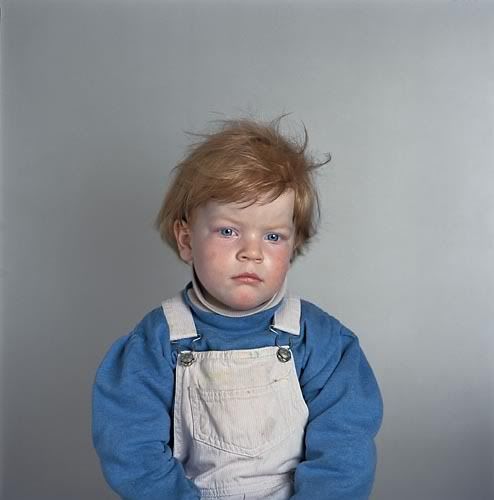 Wolfram Hahn made a series of photos titled "A Disenchanted Playroom" to accompany a study about the television-viewing habits of German children.
Wolfram Hahn made a series of photos titled "A Disenchanted Playroom" to accompany a study about the television-viewing habits of German children. The third-place photograph was taken by German photographer Hartmut Schwarzbach. His picture depicts a nine-year-old girl jumping in glee on her birthday in the midst of a smoldering garbage dump outside of Manila.
The third-place photograph was taken by German photographer Hartmut Schwarzbach. His picture depicts a nine-year-old girl jumping in glee on her birthday in the midst of a smoldering garbage dump outside of Manila.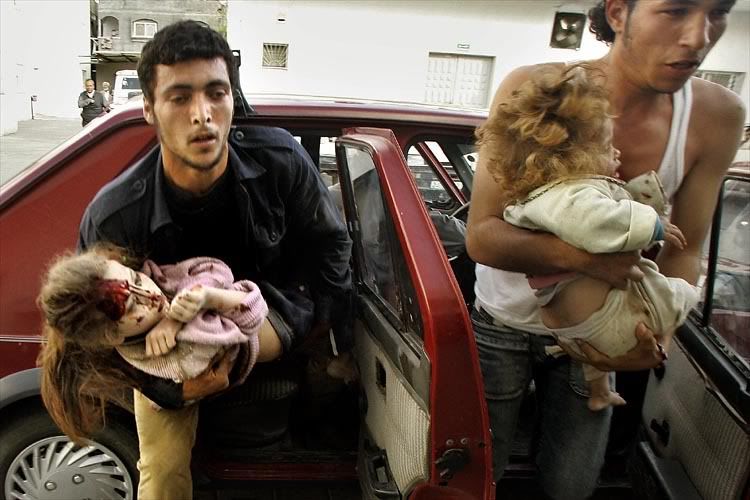 Hatem Moussa won an honorable mention for "Life in Gaza": Palestinian children were rushed from a car into a hospital after their homes were hit by Israeli shelling in the northern Gaza Strip town of Beit Lahiya in April, 2006. An eight-year-old child was killed in the attack and 13 other children were injured.
Hatem Moussa won an honorable mention for "Life in Gaza": Palestinian children were rushed from a car into a hospital after their homes were hit by Israeli shelling in the northern Gaza Strip town of Beit Lahiya in April, 2006. An eight-year-old child was killed in the attack and 13 other children were injured.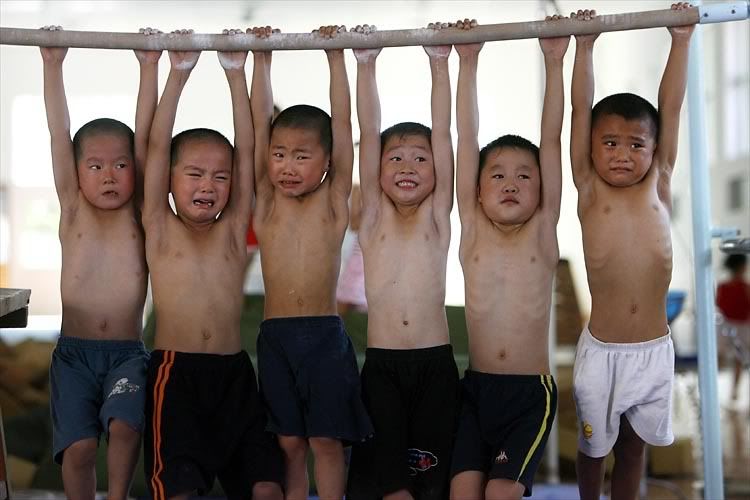 Boys hang from a bar for five minutes as part of a physical training exercise at the Gymnastics Hall of the Shanghai University of Sports. The photo was part of Nir Elias's series "Pain Threshold -- Sports Education in China."
Boys hang from a bar for five minutes as part of a physical training exercise at the Gymnastics Hall of the Shanghai University of Sports. The photo was part of Nir Elias's series "Pain Threshold -- Sports Education in China."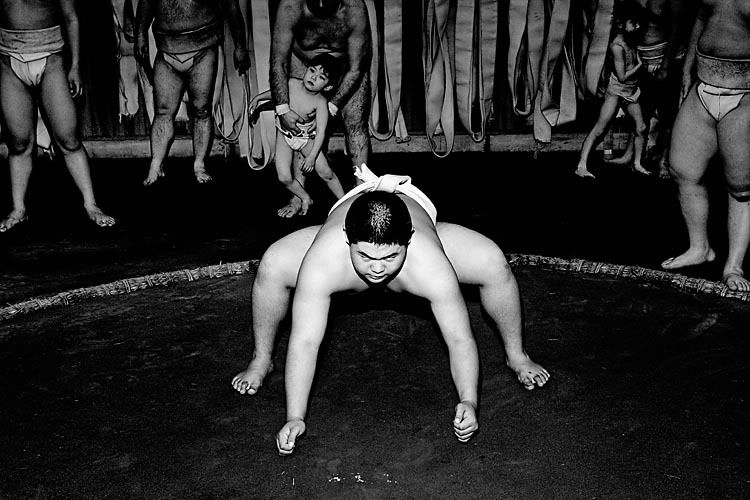 "Sumo Boys in Japan": Steven Achiam took a series of pictures depicting life in the Hiragaya sumo club, where boys train until they have beaten a strong opponent 10 times.
"Sumo Boys in Japan": Steven Achiam took a series of pictures depicting life in the Hiragaya sumo club, where boys train until they have beaten a strong opponent 10 times.